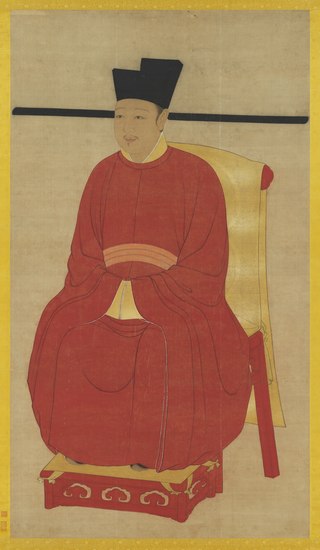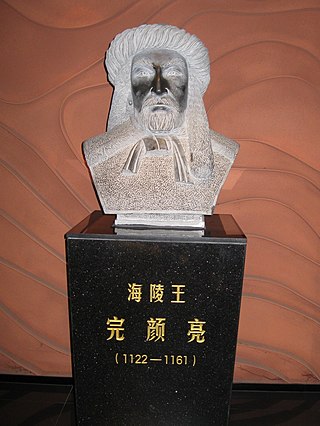Related Research Articles

Emperor Huizong of Song,personal name Zhao Ji,was the eighth emperor of the Song dynasty of China. He was also a very well-known calligrapher. Born as the 11th son of Emperor Shenzong,he ascended the throne in 1100 upon the death of his elder brother and predecessor,Emperor Zhezong,because Emperor Zhezong's only son died prematurely. He lived in luxury,sophistication and art in the first half of his life. In 1126,when the Jurchen-led Jin dynasty invaded the Song dynasty during the Jin–Song Wars,Emperor Huizong abdicated and passed on his throne to his eldest son,Zhao Huan while Huizong assumed the honorary title of Taishang Huang. The following year,the Song capital,Bianjing,was conquered by Jin forces in an event historically known as the Jingkang Incident. Emperor Huizong and Emperor Qinzong and the rest of their family were taken captive by the Jurchens and brought back to the Jin capital,Huining Prefecture in 1128. The Emperor Taizong of Jin,gave the former Emperor Huizong a title,Duke Hunde,to humiliate him. After Zhao Gou,the only surviving son of Huizong to avoid capture by the Jin,declared himself as the dynasty's tenth emperor as Emperor Gaozong,the Jurchens used Huizong,Qinzong,and other imperial family members to put pressure on Gaozong and his court to surrender. Emperor Huizong died in Wuguocheng after spending about nine years in captivity.

Emperor Taizu of Jin,personal name Aguda,sinicised name Min,was the founder and first emperor of the Jurchen-led Jin dynasty of China. He was originally the chieftain of the Wanyan tribe,the most dominant among the Jurchen tribes which were subjects of the Khitan-led Liao dynasty. Starting in 1114,Aguda united the Jurchen tribes under his rule and rebelled against the Liao dynasty. A year later,he declared himself emperor and established the Jin dynasty. By the time of his death,the Jin dynasty had conquered most of the Liao dynasty's territories and emerged as a major power in northern China. In 1145,he was posthumously honoured with the temple name Taizu by his descendant Emperor Xizong.
Emperor Zhangzong of Jin,personal name Madage,sinicized name Wanyan Jing,was the sixth emperor of the Jurchen-led Jin dynasty of China. He reigned from 20 January 1189 to 29 December 1208.

Emperor Taizong of Jin,personal name Wuqimai,sinicised name Wanyan Sheng,was the second emperor of the Jurchen-led Jin dynasty of China. His era name was "Tianhui" (天會). During his reign,the Jin dynasty conquered the Khitan-led Liao dynasty. He then led the Jin in their campaigns against the Song dynasty,captured the Northern Song capital in 1127 and went on to rule most of northern China. After his death,he was posthumously honoured with the temple name Taizong by his successor,Emperor Xizong.
Emperor Xizong of Jin,personal name Hela,sinicised name Wanyan Dan,was the third emperor of the Jurchen-led Jin dynasty of China. He reigned for about 15 years from 1135 to 1150. During his reign,the Jin dynasty launched several military campaigns against the Han-led Southern Song dynasty in southern China.

Digunai,also known by his sinicised name Wanyan Liang (完顏亮) and his formal title Prince of Hailing,was the fourth emperor of the Jurchen-led Jin dynasty of China. He was the second son of Wanyan Zonggan,the eldest son of Aguda. He came to power in 1150 after overthrowing and murdering his predecessor,Emperor Xizong,in a coup d'état. During his reign,he moved the Jin capital from Shangjing to Yanjing,and introduced a policy of sinicisation. In 1161,after the Jin dynasty lost the Battle of Caishi against the Southern Song dynasty,Digunai's subordinates rebelled against him and assassinated him. After his death,even though he ruled as an emperor during his lifetime,he was posthumously demoted to the status of a prince –"Prince Yang of Hailing" (海陵煬王) –in 1162 by his successor,Emperor Shizong. However,in 1181,Emperor Shizong further posthumously demoted him to the status of a commoner,hence he is also known as the "Commoner of Hailing" (海陵庶人).
Hanpu,later Wanyan Hanpu,was a leader of the Jurchen Wanyan clan in the early tenth century. According to the ancestral story of the Wanyan clan,Hanpu came from Goryeo when he was sixty years old,reformed Jurchen customary law,and then married a sixty-year-old local woman who bore him three children. His descendants eventually united Jurchen tribes into a federation and established the Jin dynasty in 1115. Hanpu was retrospectively given the temple name Shizu (始祖) and the posthumous name Emperor Yixian Jingyuan (懿憲景元皇帝) by the Jin dynasty.
The Wanyan,alternatively rendered as Wanggiya,was a clan of the Heishui Mohe tribe living in the drainage region of the Heilong River during the time of the Khitan-led Liao dynasty. Of the Heishui Mohe,the clan was counted by the Liao dynasty among the "uncivilized Jurchens" (生女真),indicating that the clan was not subject to the direct rule of the Liao emperors. Those Heishui Mohe clans ruled by the Liao dynasty were referred to as "civilized Jurchens" (熟女真). The Wanyan clan later founded the Jin dynasty.
Bahai was a chieftain of the Wanyan tribe,the most dominant among the Jurchen tribes which later founded the Jin dynasty (1115–1234). He was the eldest son of Wulu.
Suike was a chieftain of the Wanyan clan,the most dominant among the Jurchen tribes which later founded the Jin dynasty (1115–1234). He was the eldest of Bahai's five sons. Under Suike,the clan moved to the banks of the Anchuhu River,near modern-day Haerbin.
Shilu was a chieftain of the Wanyan tribe,the most dominant among the Jurchen tribes which later founded the Jin dynasty (1115–1234). He was the eldest son of Suike. He was appointed chieftain of the Wanyan tribe by the Khitan-led Liao dynasty,which ruled northern China between the 10th and 11th centuries.
Horimbo (1039—1092) was a chieftain of the Wanyan tribe,the most dominant among the Jurchen tribes which later founded the Jin dynasty (1115–1234). He was the second son of Ukunai. Like his grandfather,Šilu,Horimbo was appointed chieftain of the Wanyan tribe by the Khitan-led Liao dynasty,which ruled northern China between the 10th and 11th centuries.
Empress Tudan was the empress of the fourth emperor of the Jurchen-led Chinese Jin dynasty,Digunai. After his murder,she was demoted to commoner status. She was one of three Jin empresses from the Tudan clan.
Empress Mingde of the Wulinda clan,also known by her first posthumous name Empress Zhaode,was the wife of Emperor Shizong of Jin,the fifth emperor of the Jurchen-led Chinese Jin dynasty. Although she committed suicide before her husband became emperor,he proclaimed her empress upon his ascension and never gave the title to any other of his consorts.
Empress Qinhuai of the Pucha clan was the wife of Emperor Zhangzong of Jin,the sixth emperor of the Jurchen-led Jin dynasty of China. She died before he ascended the throne and was made empress posthumously.
Princess Consort Shao of Wei,also known as Empress Tudan,was the wife of the seventh emperor of the Jurchen-led Chinese Jin dynasty,Wanyan Yongji. After her husband was killed,she was stripped of her title and banished to Zhengzhou.
Wanyan Zongjun (完顏宗峻),also known by his Jurchen name Shengguo (繩果),was an imperial prince of the Jurchen-led Jin dynasty. He was the second or third son of Emperor Taizu with his first empress,Empress Shengmu.
Wanyan Yungong,personal name Hutuwa (胡土瓦),was an imperial prince of the Jurchen-led Jin Dynasty. He was the son of Emperor Shizong of Jin an Empress Mingde. He was the father of Emperor Zhangzong of Jin and Emperor Xuanzong of Jin.
Zhu Cilang was a crown prince of the Ming dynasty. He was the eldest son of the Chongzhen Emperor and Lady Zhou,Empress Xiaojielie,and he was made the crown prince in 1630.
References
- ↑ "列传第五十八 世戚(Biographies 58, Kin)". 金史[ History of Jin ] (in Classical Chinese). Vol. 120.
- 1 2 3 4 "列传第一 后妃上 (Biographies 1, Imperial wives and concubines)". 金史[ History of Jin ] (in Classical Chinese). Vol. 63.
- ↑ "列传第十八 (Biographies 18)". 金史[ History of Jin ] (in Classical Chinese). Vol. 80.
- ↑ Ding Yu 丁瑜; Dong Lihui 董丽晖 (2020). "金熙宗悼平皇后研究" [Study of Xizong's Empress Daoping]. Shidai Baogao 时代报告 (in Chinese) (3): 121–3.
- 1 2 "列传第八 (Biographies 8)". 金史[ History of Jin ] (in Classical Chinese). Vol. 70.